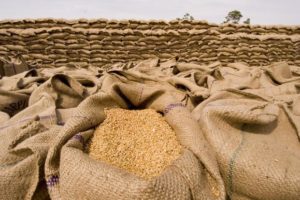
The Federal Government says it is ready to put an end to the continuous importation of wheat so as to boost local production and encourage farmers in the country.
The Minister of Agriculture and Rural Development, Audu Ogbeh, said this at the International Conference on Wheat, organised by the Support to Agricultural Research for Development of Strategic Crops (SARD-SC) project of the AfDB.
The minister, who was represented by Dr Muyiwa Azeez, the Director of Agribusiness and Marketing in the ministry, said that the country was currently producing high-quality wheat.
“As a result of this, the Flour Milling Association of Nigeria submitted a written commitment to the ministry, stating that they will off-take all the wheat produced by Nigerian wheat farmers,” he said.
Gov. Abubakar Bagudu of Kebbi State said that certain agronomic practices, which initially reduced wheat yield per hectare, had been addressed by research institutes across the country.
He listed some of the states that had improved their wheat production as Kebbi, Kano, Kaduna, Jigawa, Sokoto, Bauchi, Zamfara, Gombe, Niger and Plateau, among others.
Bagudu, however, noted that `trade wars’ was a major factor behind the inability of Nigeria and Africa to achieve sufficiency in wheat production.
He called for proper research to enable policy makers to make informed decisions on how to boost wheat production in the country.
“Last year, only about five states recorded a significant increase in wheat production but as a result of mobilisation, about 11 states have improved inputs and increased yields.
“If we have no research that informs policy makers about the totality of support that is given in countries, with whom we are competing and from whom we are importing, we are likely to continue penalising our wheat value chain.
“African wheat is competitive but farmers need support,” he said.
Rep. Mohammed Monguno, the Chairman, House of Representatives Committee on Agriculture, assured farmers that the National Assembly would encourage policies that would boost the production of wheat and other agricultural produce in the country.
Akinwunmi Adesina, the President of African Development Bank (AfDB), said that wheat production had the capacity to inject 13.4 billion U.S. dollars into the Nigerian economy.
Adesina, represented by Chiji Ojukwu, the Director of Agriculture in the bank, said that AfDB, via with its agricultural programmes, was planning to increase the production of wheat from 2.5 tonnes to 7 tonnes per hectare.
He noted that the SARD-SC project, which was a four-year programme, was funded by AfDB with 63 million U.S. dollars.
Dr Solomon Assefa, the Coordinator of the SARD-SC wheat project, said that the project was aimed at enhancing food security and nutrition in Africa.
He said that it also aimed at enhancing the economic growth of 12 African countries while contributing to their poverty reduction efforts.
According to him, wheat consumption in Africa has increased significantly, with the cost of wheat importation rising close to 15 billion U.S. dollars.
Assefa, however, said that some of the challenges facing wheat production included environmental conditions, technology, policies and marketing.
He said that Nigeria had increased its wheat production from 70,000 tonnes in 2012 to 400,000 tonnes in 2016.
However, Salim Mohammed, the President, Wheat Farmers Association of Nigeria, said that farmers had no access to improved seeds and modern farming equipment to boost production.
He called on the government at all levels to provide farming inputs that would encourage local production of wheat in the country.
Copyright Ships & Ports Ltd. Permission to use quotations from this article is granted subject to appropriate credit given to www.shipsandports.com.ng as the source.
